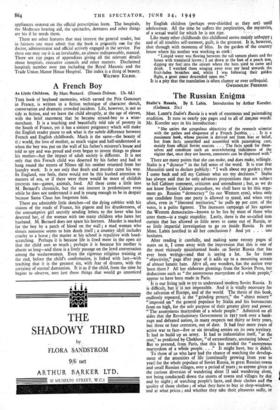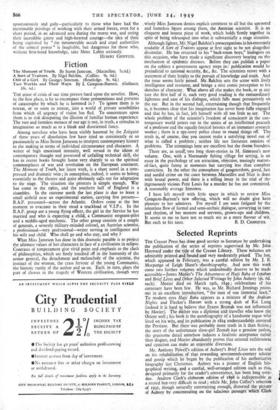The Russian Enigma
Stalin's Russia. By S. Labia. Introduction by Arthur Koestler. (Gollancz. 21s.) MME. LABIN'S Stalin's Russia is a work of enormous and painstaking erudition. It runs to nearly goo pages and to all of 200,000 words. Mr. Koestler says in his introduction: " She unites the scrupulous objectivity of the research scientist with the pathos and eloquence of a French Jacobin. . . . It is a passionate book, whose passion is derived not from bias or belief, but from facts unearthed and assembled with painstaking care, mainly from official Soviet sources. . . . The facts speak for them- selves and constitute such an overwhelming indictment of the regime that, once they are known, comments can be dispensed with."
There are many points that she can make, and does make, tellingly. Stalin is a " dictator " in the full sense of the word. It is true that Mussolini used to declare publicly: " I walk about my garden ; then I come back and tell my Cabinet what are my decisions." Stalin has always said that he only advances propositions that are subject to full Cabinet comment, criticism and amendment ; but, as we do not know Soviet Cabinet procedure, we shall have to let this argu- ment go. Russian " democracy " (to our Western eyes), when only one candidate from one party is allowed to stand, and when very often, even in "liberated territories," he polls 99 per cent. of the votes, is a polite figment. The incessant campaign of lies against the Western democracies—known to be lies by most of those who utter them—is a tragic stupidity. Lastly, there is the so-called iron curtain that has allowed so little news to come out of Russia, or so little impartial investigation to go on inside. Russia. Is not Mme. Labin justified in all her conclusions ? And yet . . . one hesitates.
After reading it carefully, and making some twenty pages of notes on it, I come away with the impression that this is one of the most viciously misinformed books on Soviet Russia that has ever been writtep—and that is saying a lot. So far from "objectivity," page after page of it adds up to a mounting scream of almost lunatic hate. After all, one wonders, has the author ever been there ? All her elaborate gleanings from the Soviet Press, her deductions such as " the anonymous martyrdom of a whole people," appear to have been made in Paris.
It is our living task to try to understand modern Soviet Russia. It is difficult, but it is not impossible. And it is vitally necessary for the salvation of Europe, and of the world. The thesis of this book, endlessly repeated, is the " grinding penury," the " abject misery" " imposed on " the general populace by Stalin and his bureaucrats from on high, for the sole purpose of their greater glory and power. " The anonymous martyrdom of a whole people." Admitted on all sides that the Revolutionary Government in 1917 took over a bank- rupt and defeated nation, in many respects not thirty or forty years, but three or four centuries, out of date. It had four more years of active war to face—five or six invading armies on its own territory. It had to build up an army. It had to industrialise itself, " at the cost," as predicted by Chekhov, "of extraordinary, unceasing labour." But to pretend, from Paris, that this has needed the " anonymous martyrdom of a whole people. . . ." It might have, but it didn't.
To those of us who have had the chance of watching the develop- ment of the amenities of life (continually growing from year to year) for the whole populace of Soviet Russia, in great Russian towns and small Russian villages, over a period of years ; to anyone given to the curious diversion of wandering alone (I said wandering alone, not being conducted) down the streets of towns and villages by day and by night ; of watching people's faces, and their clothes and the quality of those clothes ; of what they have to buy in shop-windows, and at what prices ; and whether they take their pleasures sadly, of spontaneously and gaily—particularly to those who have had The inestimable privilege of working with their armed forces, even for a short period, in an advanced area during the recent war, and seeing their incredible gaiety and high-hearted courage—the idea of their • being exploited by " the innumerable occult and cruel authorities of the central power " is laughable, but dangerous for those who, without first-hand knowledge, take Mme. Labin seriously.
HUBERT GRIFFITH.



































 Previous page
Previous page